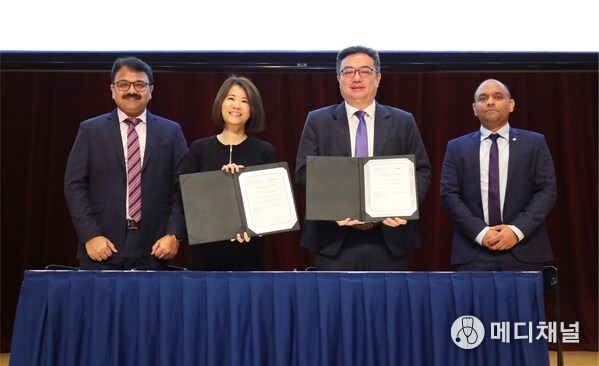[ 메디채널 김갑성 기자 ] Research focuses on human cardiac organoids to uncover metabolic drivers of heart failure and accelerate new therapeutic strategies to improve cardiovascular outcomes
SINGAPORE, Nov. 13, 2025 -- Agilent Technologies Inc. (NYSE: A) announced the signing of a five-year Memorandum of Understanding (MOU) with National Heart Centre Singapore (NHCS) to accelerate innovation in metabolic heart failure research, one of the most complex and underserved areas in cardiovascular medicine.

Agilent Seahorse XF Flex Analyzer 3D Workflow Features Metabolic Profile that Serves as Dynamic Biomarkers of Cell Health
Heart failure remains a leading global cause of death and disability¹, with metabolic forms such as diabetic heart failure and heart failure with preserved ejection fraction (HFpEF) posing challenges due to limited treatment options². Under this agreement, Agilent and NHCS will combine their expertise in human cardiac organoids using human-derived heart tissues with cutting-edge analytical technologies, including Agilent's latest Seahorse XF Flex Analyzer which expands real-time metabolic analysis into 3D tissues and organoid workflows to investigate metabolic drivers of heart failure.
"Our collaboration with Agilent allows us to advance the study of heart disease using patient-specific beating heart cells. By combining NHCS's expertise with Agilent's advanced technology, we can detect the earliest changes in how heart cells use energy before visible damage occurs. This accelerates the discovery of new therapies and safely testing them, ultimately offering hope to heart failure patients who currently have limited treatment options," said Prof Derek Hausenloy, director of the National Heart Research Institute Singapore (NHRIS) at NHCS.
NHCS has established itself as a leader in modelling monogenic cardiac diseases using patient-specific induced pluripotent stem cells (iPSCs), which led to novel therapeutic targets now undergoing clinical evaluation³,⁴. Building on this foundation, the integration of Agilent's next-generation technology and NHCS's Preclinical Platform for Development of Therapeutics for Heart Failure (PREVENT-HF) positions the collaboration to provide hypotheses for clinical validation, offering new insights into disease progression, novel therapeutic development, and assessment of treatment safety and efficacy in clinically relevant models.
"Together with NHCS, we are bridging science and technology to reimagine how metabolic heart failure is understood and treated through translational research. This partnership reflects our shared commitment to addressing the unmet needs in cardiovascular care while strengthening our leadership in the biomedical ecosystem, positioning us at the frontier of cardiovascular research locally, regionally, and globally." Said Bharat Bhardwaj, vice president of APAC sales at Agilent.
Over the past decade, Agilent has made significant contributions to research advancement aimed at improving population health in Singapore. In 2019, the National University of Singapore (NUS), National University Hospital (NUH), and Agilent launched a $38 million research hub to boost clinical diagnostics and biochemistry testing.
Last year, Agilent partnered with NUS, acting through the Yong Loo Lin School of Medicine (NUS Medicine), established the NUS-Agilent Center of Excellence in Cell Metabolism in support of the Singapore Ministry of Health's Project RESET, Cardiovascular Metabolic Disease Translational Research Programme (CVMD-TRP) and PREVENT-HF to accelerate the discovery of novel insights into the complex mechanisms of heart disease.
About Agilent Technologies
Agilent Technologies Inc. (NYSE: A) is a global leader in analytical and clinical laboratory technologies, delivering insights and innovation that help our customers bring great science to life. Agilent's full range of solutions includes instruments, software, services, and expertise that provide trusted answers to our customers' most challenging questions. The company generated revenue of $6.51 billion in fiscal year 2024 and employs approximately 18,000 people worldwide. Information about Agilent is available at www.agilent.com. To receive the latest Agilent news, subscribe to the Agilent Newsroom. Follow Agilent on LinkedIn and Facebook.
About the National Heart Centre Singapore
The National Heart Centre Singapore (NHCS) is a leading national and regional referral centre for cardiovascular diseases, offering 185 beds and a comprehensive range of cardiac care services from preventive to rehabilitative. Ranked #12 as the World's Best Cardiology Hospital by Newsweek 2025, NHCS's clinical outcomes are consistently recognized at the international level, meeting or exceeding global standards. It is also the only facility in Singapore providing heart and lung transplantation programme.
As an academic medical centre, NHCS is committed to training healthcare professionals and advancing cardiovascular health through cutting-edge translational research in collaboration with local and international collaborators.
For more information, please visit: www.nhcs.com.sg
Media Contacts
Grace Thong
| |
Agilent Technologies
| |
+65 9688 2152
| |
Belinda Lim
National Heart Centre Singapore
+65 9689 7453
|
1 https://www.who.int/health-topics/cardiovascular-diseases#tab=tab_1
|
2 Ramachandra, C. J. A., Hernandez-Resendiz, S., Crespo-Avilan, G. E., Lin, Y. H. & Hausenloy, D. J. Mitochondria in acute myocardial infarction and cardioprotection. EBioMedicine 57, 102884, doi:10.1016/j.ebiom.2020.102884 (2020).
|
3 Mehta, A. et al. Identification of a targeted and testable antiarrhythmic therapy for long-QT syndrome type 2 using a patient-specific cellular model. European heart journal 39, 1446-1455, doi:10.1093/eurheartj/ehx394 (2018).
|
4 Ramachandra, C. J. A. et al. Inhibiting cardiac myeloperoxidase alleviates the relaxation defect in hypertrophic cardiomyocytes. Cardiovascular research 118, 517-530, doi:10.1093/cvr/cvab077 (2022).
|

